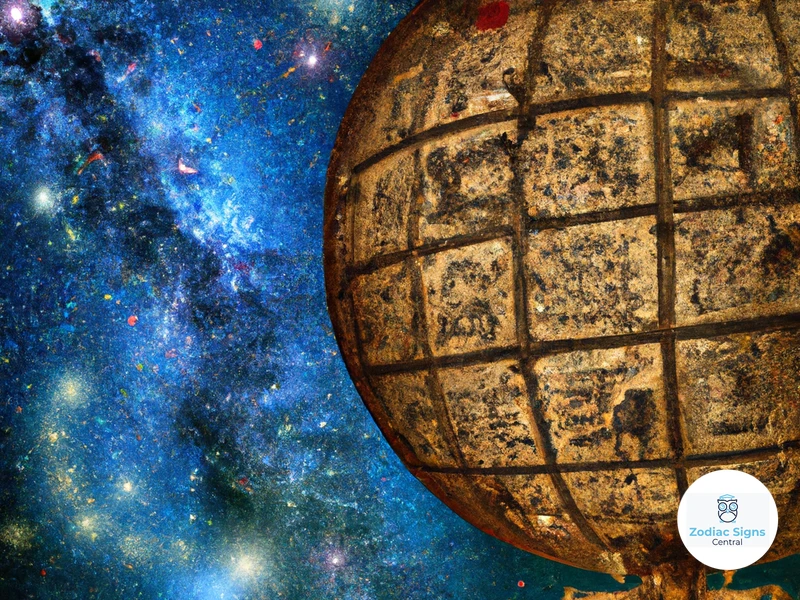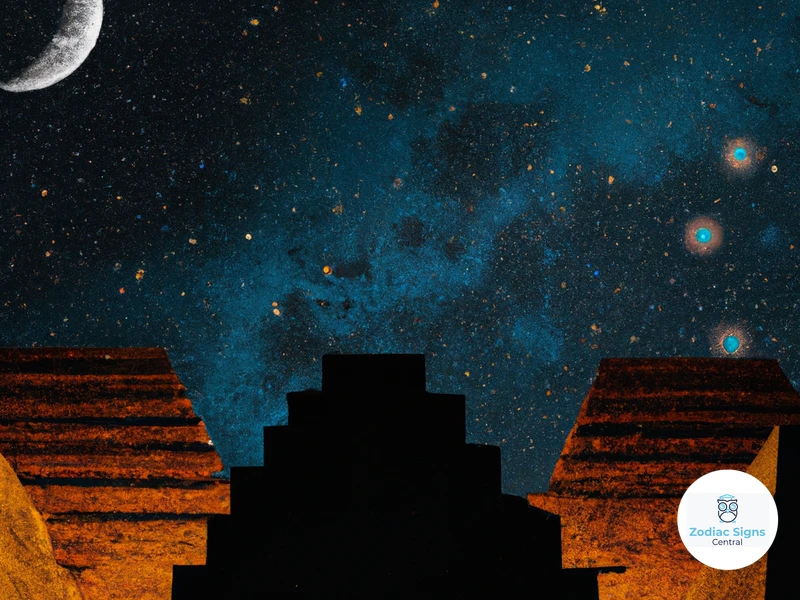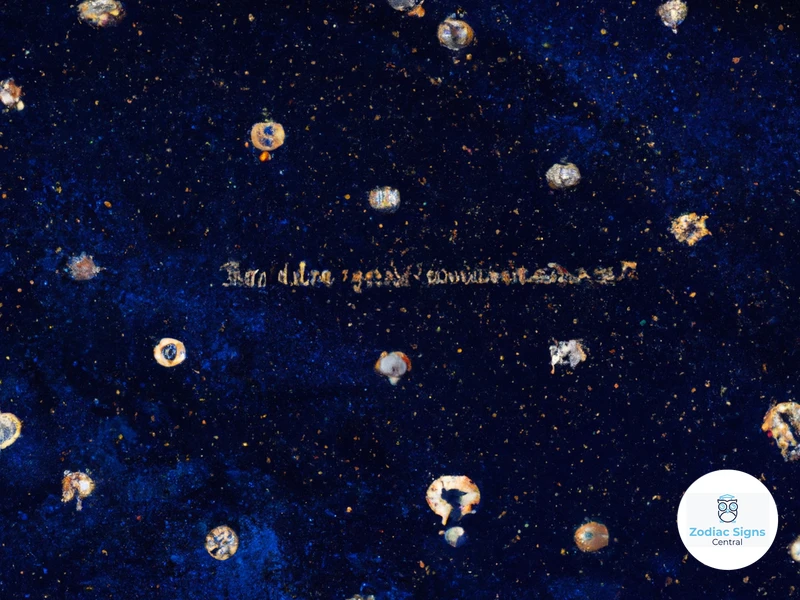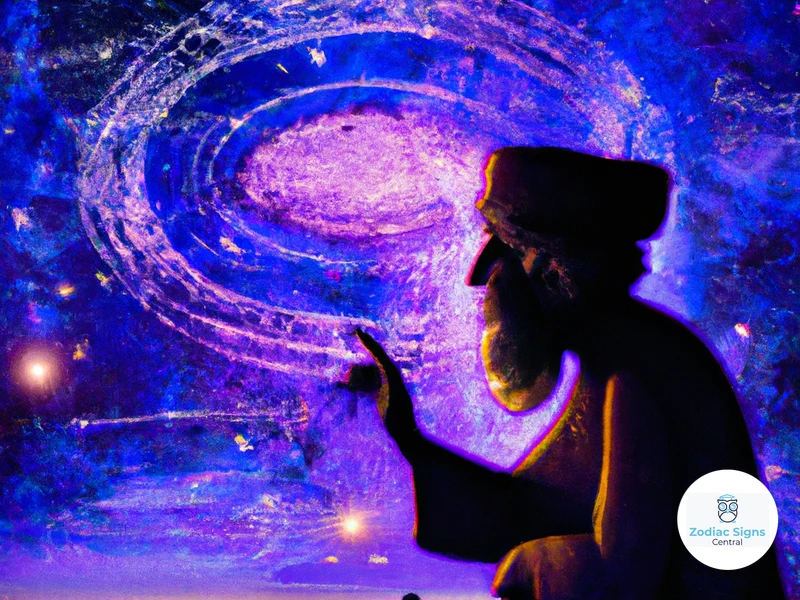Astrology, an ancient practice that seeks to understand the influence of celestial bodies on human lives, played a significant role in the civilizations of Mesopotamia. Mesopotamia, often referred to as the cradle of civilization, was home to several advanced societies, including the Babylonians, Assyrians, Sumerians, and Akkadians. In this article, we will explore the fascinating role of astrology in each of these cultures, delving into its origins, beliefs, and impact on society. From the birth of astrology in Babylon to its influence on Western traditions and the daily lives of Mesopotamian people, we will uncover the rich and complex tapestry that connects the stars to the ancient civilizations of Mesopotamia.
Astrology and the Babylonians

The Babylonians, one of the most influential civilizations in ancient Mesopotamia, had a profound connection with astrology. They believed that celestial events and the positions of celestial bodies had a direct impact on the fate and nature of individuals and the entire kingdom. Babylonian priests, known as astrologers, meticulously observed and recorded celestial movements, developing an intricate system of divination and prediction.
1. The Birth of Astrology: Astrology originated in Babylon during the 2nd millennium BCE. As the Babylonians witnessed the repetitive patterns of the stars, they began to interpret these celestial movements as messages from the gods. They believed that by studying the heavens, they could gain insight into the future, predict events, and understand the will of the gods. This marked the birth of astrology as a scientific and spiritual practice in Babylonian society.
2. Astrology in Babylonian Society: Astrology played a crucial role in Babylonian society, influencing various aspects of life, including politics, agriculture, and personal well-being. Kings consulted astrologers before making important decisions, seeking guidance on matters of war, governance, and alliances. Babylonians also utilized astrology for mundane matters such as determining auspicious times for planting crops and conducting important religious ceremonies.
Babylonian astrology revolved around the alignment of celestial bodies, especially the Sun, Moon, and the five visible planets. They associated each celestial body with specific gods and goddesses, attributing various qualities and influences to them. For instance, they revered the planet Venus as the goddess Ishtar, connecting it to love, beauty, and fertility. This celestial association allowed the Babylonians to further understand and predict aspects of human life, such as romance and procreation.
Their astrological system heavily influenced later civilizations, including the Greeks and Romans, who incorporated Babylonian astrological concepts into their own practices. To this day, Babylonian astrology continues to shape our understanding of the zodiac signs, celestial divination, and even personal interpretations, such as career choices based on astrological alignments.
Astrology and the Assyrians
Astrology held great significance in the ancient Assyrian civilization, where it played a central role in their religious and societal practices. The Assyrians, known for their advanced knowledge in various fields, recognized the influence of celestial bodies on human affairs and sought guidance from the heavens through astrology.
1. The Influence of the Stars: The Assyrians believed that the position and movement of celestial bodies directly impacted the events and outcomes of human lives. They considered the stars, planets, and constellations to be divine entities that communicated messages from the gods. By observing and interpreting these celestial movements, Assyrian astrologers attempted to gain insight into future events, determine omens, and make informed decisions.
2. Astrological Practices and Beliefs: Astrology played a vital role in Assyrian society, influencing various aspects of their culture. The Assyrians consulted astrologers for guidance on matters such as warfare, agriculture, and governance. Kings and rulers would seek astrological counsel before making important decisions, ensuring they were in alignment with the cosmic order.
Assyrian astrologers focused on interpreting the movements of celestial bodies, particularly the planets, to understand their symbolic meanings and influences. They established relationships between celestial bodies and deities, attributing specific qualities and powers to each. For example, the Assyrians associated Jupiter with the god Marduk, who represented kingship and power.
Astrology permeated the daily lives of the Assyrian people. It influenced their personal and family matters, including decisions related to marriage, childbirth, and family well-being. Assyrians believed that astrological readings could provide guidance and predictions for family and home life.
The legacy of Assyrian astrology can be traced through the development of zodiac signs and their meanings. Today, individuals may refer to astrology for insights into their career choices based on their zodiac sign’s compatibility with different occupations and industries.
Role of Astrology in Sumerian Culture

The Sumerians, an ancient civilization in Mesopotamia, also placed great importance on astrology in their culture. Here, we will explore the role of astrology in Sumerian society, shedding light on their beliefs and practices.
1. The Sumerian Pantheon and Astrology: The Sumerians worshipped a pantheon of gods and goddesses, and their astrological system was intricately connected to their deities. They believed that each celestial body corresponded to a specific deity, and these gods influenced various aspects of life on Earth. For example, the Sun god Utu was associated with justice and truth, while the Moon god Nanna governed fertility and the tides.
The Sumerians developed a detailed calendar based on the movements of celestial bodies, which helped them determine propitious times for conducting religious ceremonies and important agricultural activities like planting and harvesting crops. They also believed that the positions of the stars at the time of a person’s birth influenced their character and destiny, a belief that still resonates in contemporary astrology with practices such as predicting career choices based on zodiac signs.
2. Astrology in Sumerian Daily Life: Astrology permeated various aspects of Sumerian daily life. They consulted astrologers, known as “baru,” to interpret celestial omens and guide decision-making. Astrologers studied celestial phenomena, including eclipses, comets, and meteor showers, to reveal messages from the gods and provide insights into the future.
The Sumerians maintained cuneiform tablets containing astrological texts, recording celestial observations and providing interpretations with guidance on matters such as agricultural activities, health, and relationships. These astrological texts formed the basis of astrological knowledge in their society, serving as valuable references for future generations.
While Sumerian astrology did not have as profound an impact on later civilizations as Babylonian astrology, its contributions to understanding celestial symbolism and the influence of celestial bodies on human lives cannot be disregarded. The Sumerians’ fascination with the celestial realm and their belief in the connection between gods, stars, and human existence laid a foundation for the development of astrology throughout the ancient world.
Astrology and the Akkadians
Astrology played a significant role in the ancient civilization of the Akkadians, who inherited much of their astrological knowledge from the Babylonians. The Akkadians, who ruled over Mesopotamia between the 24th and 22nd centuries BCE, recognized the importance of astronomy and its connection to divine forces.
1. The Akkadian Connection to Mesopotamian Astrology: The Akkadians, led by their influential kings and rulers, embraced the astrological practices of the Babylonians. They viewed the study of celestial movements as a means of communicating with their gods and as a tool for understanding the will of higher powers. In fact, the Akkadian Empire’s capital city, Akkad, became a center for astronomy and astrology, attracting scholars and priests who dedicated themselves to the study and interpretation of the stars.
2. Astrologers’ Role in Akkadian Society: Astrologers held esteemed positions in Akkadian society. They were consulted by the ruling elite, nobles, and commoners alike for advice and guidance on various matters, including personal affairs, agriculture, and governance. Astrologers used their knowledge of celestial movements and interpretation of omens to provide insights into events, predict future outcomes, and offer strategic counsel.
The Akkadians, much like the Babylonians, associated celestial bodies with specific deities. They believed that each god and goddess governed different aspects of life and that their movements through the heavens influenced the corresponding realms on Earth. This sacred connection between the celestial and the earthly allowed Akkadian astrologers to predict and interpret events ranging from natural phenomena to political changes.
While the Akkadian Empire eventually fell, their influence on Mesopotamian astrology persisted. Their practices, fused with those of the Babylonians, formed the foundation for later astrological traditions in the region. The legacy of Akkadian astrology extends beyond Mesopotamia, as it continues to shape our understanding of celestial divination and the influence of the stars on human lives.
The Influence of Mesopotamian Astrology

Astrology in Mesopotamia had a profound impact, leaving a lasting influence on both Western astrological traditions and the cultures of the region.
1. Legacy in Western Astrological Traditions: The knowledge and practices of Mesopotamian astrology spread beyond its borders and greatly influenced the development of astrology in the Western world. The Greeks, who had contact with Mesopotamian civilizations, adopted and incorporated many Babylonian astrological concepts into their own system. This fusion of beliefs and practices laid the foundation for Western astrology as we know it today. The zodiac, which plays a central role in Western astrology, was based on the ancient Mesopotamian division of the sky into twelve equal parts, each associated with specific constellations.
2. Impact on Mesopotamian Society and Culture: Astrology held immense significance in the lives of the Mesopotamian people. It shaped their decisions and influenced various aspects of daily life. From determining the ideal time for important events, such as marriages or building projects, to seeking guidance on matters of health and personal well-being, astrology permeated every aspect of society. Astrologers were highly respected and sought after for their advice and interpretation of celestial omens. Their role extended beyond fortune-telling; they served as counselors, helping individuals and even rulers make informed choices and navigate life’s uncertainties.
Astrology’s influence was not limited to individual lives; it also had a significant impact on religious and cultural practices. The Mesopotamians believed that the celestial bodies were divine entities, and astrology provided a means to communicate with the gods. Astrological divinations were an integral part of religious rituals, with priests often consulting astrological charts to understand divine will and seek guidance for important events.
Mesopotamian astrology left an indelible mark on human history. Its impact can be seen in the continued popularity and practice of astrology in the modern world, as well as in the enduring legacy of Mesopotamian civilizations, whose celestial insights continue to inspire and captivate us today.
Conclusion
In conclusion, the role of astrology in ancient Mesopotamia, particularly among the Babylonians, Assyrians, Sumerians, and Akkadians, was of great significance. The Babylonians, with their meticulous observations and interpretations of celestial movements, established astrology as a scientific and spiritual practice. It permeated various aspects of Babylonian society, including politics, agriculture, and personal well-being.
Astrology in Mesopotamia was not merely a form of divination but was deeply intertwined with religious beliefs and the worship of gods and goddesses associated with celestial bodies. The influence of Babylonian astrology extended beyond their civilization, shaping later Western astrological traditions. It played a crucial role in the development of zodiac signs, the interpretation of celestial phenomena, and the understanding of personal characteristics and predictions.
Furthermore, the impact of astrology in Mesopotamia cannot be understated in regards to society and culture. Astrology guided the decisions of kings, influenced the timing of important events and agricultural practices, and shaped the daily lives of individuals. It was seen as a means of connecting with the divine and seeking guidance from the heavens.
As we explore the rich history of Mesopotamian astrology, it is clear that the ancient civilizations of this region held a deep reverence for the stars and their movements. Their belief in the power of celestial bodies to shape destiny and provide insight into the human condition laid the foundation for the development of astrology as we know it today.
Although millennia have passed since the height of Mesopotamian civilization, their contributions to astrology continue to resonate in our modern understanding and practice of this ancient art.
Frequently Asked Questions

1. How did the Babylonians study celestial movements?
The Babylonians studied celestial movements through meticulous observation and recording. They developed advanced astronomical techniques and tools to track the positions of celestial bodies.
2. Did the Babylonians believe that celestial events affected individual fate?
Yes, the Babylonians believed that celestial events, such as planetary alignments and eclipses, directly influenced the fate and nature of individuals. They saw these events as messages from the gods.
3. Were the Babylonians the first civilization to practice astrology?
No, astrology was practiced in other cultures before the Babylonians. However, the Babylonians played a crucial role in advancing and shaping astrology into a more systematic and organized discipline.
4. How did astrology impact Babylonian politics?
Astrology had a significant impact on Babylonian politics. Kings would consult astrologers before making important decisions, seeking guidance on matters such as war, governance, and alliances.
5. Did astrology influence agriculture in Babylonian society?
Yes, Babylonians utilized astrology in determining auspicious times for planting crops and conducting important agricultural activities. They believed that aligning their farming practices with celestial movements would yield better harvests.
6. Which celestial body was associated with love and beauty in Babylonian astrology?
Venus, known as the goddess Ishtar in Babylonian astrology, was associated with love, beauty, and fertility. The Babylonians believed that the movements of Venus in the night sky influenced aspects of human life such as romance and procreation.
7. How did Babylonian astrology influence later civilizations?
Babylonian astrology heavily influenced later civilizations, particularly the Greeks and Romans. Their concepts and interpretations of celestial divination, zodiac signs, and the influence of planets were adopted and incorporated into these cultures.
8. Did Babylonian astrology have any impact on career choices?
Yes, the Babylonians believed that the alignment of celestial bodies could provide insights into one’s future and potential career paths. This notion of using astrology to make decisions about career choices has continued through the centuries.
9. Were astrologers highly regarded in Babylonian society?
Astrologers held a respected and revered position in Babylonian society. Their expertise in interpreting celestial events and providing guidance made them influential figures sought after by kings, nobles, and the general population.
10. How does Babylonian astrology continue to impact modern interpretations of the zodiac?
Elements of Babylonian astrology persist in modern interpretations of the zodiac, with the association of specific planetary movements and qualities to each zodiac sign. This ongoing influence connects our contemporary understanding of astrology with its ancient origins in Mesopotamia.
References
Frequently Asked Questions

1. How did astrology originate in ancient Mesopotamia?
Astrology in ancient Mesopotamia originated as a way to understand and predict celestial events and their impact on human life. It developed as early as the 2nd millennium BCE.
2. What role did astrology play in Babylonian society?
Astrology played a significant role in Babylonian society, where it was seen as a way to communicate with the gods and gain insight into the future. It influenced daily life, politics, and even the construction of cities.
3. What did astrology mean to the ancient Assyrians?
Astrology held immense importance for the ancient Assyrians, who believed that celestial phenomena directly impacted human affairs. They relied on astrology to make important decisions and guide their actions.
4. How did astrology integrate into Sumerian culture?
Astrology played a vital role in Sumerian culture, as they believed that the movements of celestial bodies controlled all aspects of life. It was closely tied to their religious beliefs and rituals.
5. In what ways did astrologers influence Akkadian society?
Astrologers held a prominent position in Akkadian society and were considered experts in interpreting celestial omens. They advised kings and leaders, helping shape political decisions and strategies.
6. How did Mesopotamian astrology influence Western astrological traditions?
Mesopotamian astrology greatly influenced Western astrological traditions. Its concepts and techniques were passed down through ancient Greek and Roman civilizations, shaping the foundations of astrology as we know it today.
7. What legacy did Mesopotamian astrology leave on society and culture?
The legacy of Mesopotamian astrology can still be seen in various aspects of society and culture. It influenced art, literature, and religious practices, leaving a lasting impact on the ancient Mesopotamian civilizations.
8. How did astrology impact daily life in ancient Mesopotamia?
Astrology impacted daily life in ancient Mesopotamia by guiding important decisions such as marriage, childbirth, and travel. Individuals consulted astrologers to determine auspicious dates and make choices aligned with the stars.
9. What relationship did ancient Mesopotamians believe existed between the stars and their deities?
Ancient Mesopotamians believed that the celestial bodies were representations of their deities. The movements of the stars were seen as a manifestation of divine will, influencing the fates of individuals and society as a whole.
10. How did ancient Mesopotamians interpret celestial omens?
Ancient Mesopotamians interpreted celestial omens through complex divinatory processes. They observed the positions and alignments of the stars, planets, and other celestial bodies to predict events and understand their implications.
References
- Astrology in Ancient Mesopotamia: The Science of Omens …
- Astrology & Astronomy in Iran and Ancient Mesopotamia
- Astrology in Ancient Mesopotamia: The Science of Omens …






